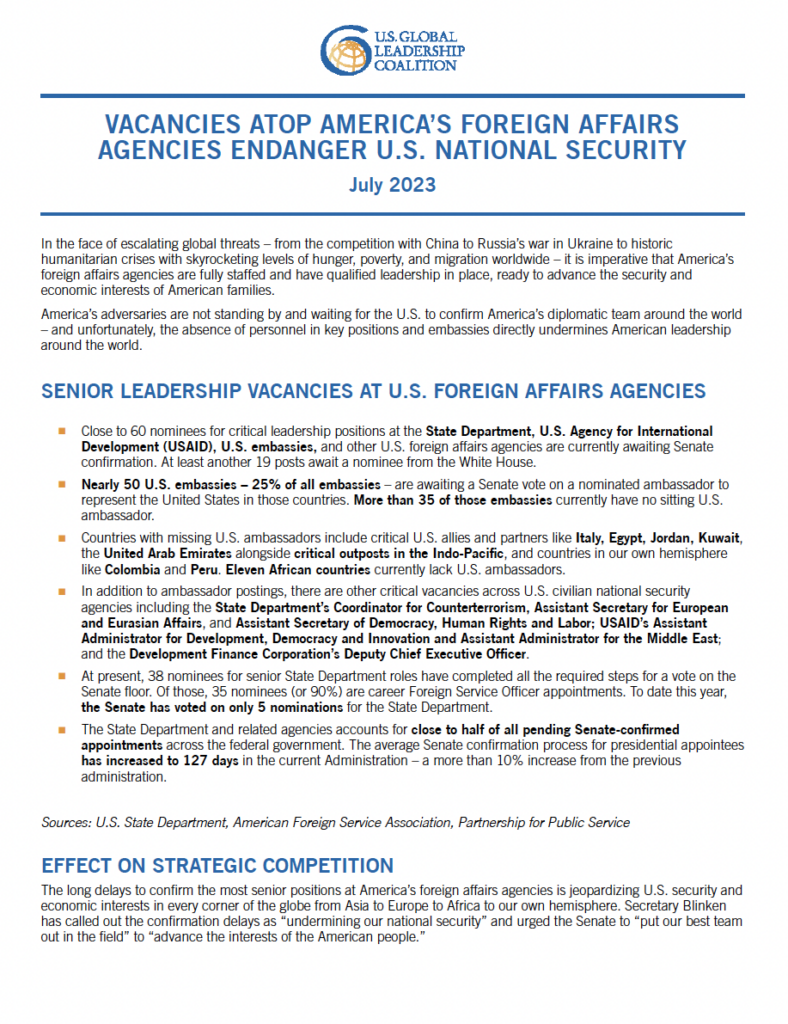Download PDF
In the face of escalating global threats – from the competition with China to Russia’s war in Ukraine to historic humanitarian crises with skyrocketing levels of hunger, poverty, and migration worldwide – it is imperative that America’s foreign affairs agencies are fully staffed and have qualified leadership in place, ready to advance the security and economic interests of American families.
America’s adversaries are not standing by and waiting for the U.S. to confirm America’s diplomatic team around the world – and unfortunately, the absence of personnel in key positions and embassies directly undermines American leadership around the world.
Senior Leadership Vacancies at U.S. Foreign Affairs Agencies
- Close to 50 nominees for critical leadership positions at the State Department, U.S. Agency for International Development (USAID), U.S. embassies, and other U.S. foreign affairs agencies are currently awaiting Senate confirmation. At least another 19 posts await a nominee from the White House.
- Nearly 40 U.S. embassies – 20% of all embassies – are awaiting a Senate vote on a nominated ambassador to represent the United States in those countries. More than 30 embassies currently have no sitting U.S. ambassador.
- Countries with missing U.S. ambassadors include critical U.S. allies and partners like Egypt, Kuwait and Colombia, alongside eight critical outposts in the Indo-Pacific. Another eight African countries currently lack U.S. ambassadors.
- In addition to ambassador postings, there are other critical vacancies across U.S. civilian national security agencies including the State Department’s Coordinator for Counterterrorism, Assistant Secretary for European and Eurasian Affairs, and Assistant Secretary of Democracy, Human Rights and Labor; and USAID’s Assistant Administrator for Development, Democracy and Innovation and Assistant Administrator for the Middle East.
- At present, 24 nominees for senior State Department roles have completed all the required steps for a vote on the Senate floor. Of those, 20 nominees (or more than 80%) are career Foreign Service Officer appointments.
- The State Department and related agencies accounts for close to half of all pending Senate-confirmed appointments across the federal government. The average Senate confirmation process for presidential appointees has increased to 127 days in the current Administration – a more than 10% increase from the previous administration.
Sources: U.S. State Department, American Foreign Service Association, Partnership for Public Service
Effect on Strategic Competition
The long delays to confirm the most senior positions at America’s foreign affairs agencies is jeopardizing U.S. security and economic interests in every corner of the globe from Asia to Europe to Africa to our own hemisphere. Secretary Blinken has called out the confirmation delays as “undermining our national security” and urged the Senate to “put our best team out in the field” to “advance the interests of the American people.”
- Indo-Pacific. As of 2021, the People’s Republic of China had overtaken the United States with its diplomatic footprint, not only in the number of embassies and consulates globally, but in missions to multilateral and international organizations, according to the Lowy Institute’s Global Diplomacy Index. To strengthen America’s presence, new U.S. embassies in the region have been or will be opened in Tonga, Kiribati, and the Solomon Islands – all in need of U.S. ambassadors.
- Europe. As Russia’s war in Ukraine continues into its second year, critical civilian national security posts remain vacant limiting America’s ability to protect U.S. national interests, fully engage with its allies and partners, and support the Ukrainian people. These posts include the State Department’s Assistant Secretary for European and Eurasian Affairs, the U.S. Director of the European Bank for Reconstruction and Development, and the USAID Assistant Administrator for Development, Democracy, and Innovation.
- Africa. The United States lacks ambassadors to 8 African countries – including Egypt and Nigeria – along with a vacancy for the U.S. Ambassador to the African Union. These vacancies are impeding progress on conflict, food security, and economic initiatives along with America’s ability to effectively counter the presence of Russia’s Wagner Group and China’s economic and military expansion throughout the continent. In addition. In fact, China has not only far surpassed the U.S. as Africa’s largest trading partner, but there are reports that it is seeking to build naval bases on the Atlantic coast.
- Latin America and the Caribbean. The U.S. is missing ambassadors in 6 countries including critical allies and partners like Colombia. Since 2005, the China Development Bank and China-Export Import Bank have provided more than $136 billion in loan commitments to LAC countries and state-owned enterprises. Beijing has used its development investments to pursue its geopolitical goals, including the further isolation of Taiwan and to bolster authoritarian regimes such as those in Cuba and Venezuela.
- Middle East. Despite continued conflict across the Middle East, from Iraq to Syria to Iran, the Assistant Administrator for the Middle East has been vacant for more than two years and the U.S. lacks Ambassadors in some of the most strategically important countries – including Kuwait and Oman. America’s reduced engagement comes as Beijing has facilitated diplomatic breakthroughs between Iran and Saudi Arabia.
Vacant Ambassadorial Positions
Of a total 194 ambassadorial roles within foreign countries and international organizations, the following 32 posts currently have no sitting U.S. ambassador.
- Afghanistan
- African Union
- Albania
- Azerbaijan
- Bahamas
- Belarus
- Bolivia
- Burma
- Burundi
- Colombia
- Croatia
- Cuba
- Djibouti
- Dominican Republic
- Egypt
- Eswatini
- Gabon
- Haiti
- International Civil Aviation Organization
- Kuwait
- Libya
- Marshall Islands
- Nigeria
- Oman
- Papua New Guinea & Vanuatu
- Solomon Islands
- Timor-Leste
- Tonga
- UN Agencies for Food and Agriculture
- Zimbabwe
- OECD


